Kuwait Food Culture: A Rich Culinary Journey through Tradition and Innovation
Kuwait is not only a country of rich history and wonders of modernity, but it is also a place where flavors and cuisine pleasantly titillate your senses. Kuwait's food culture is an intricate blend of traditional flavors, local flavors, and innovation. Whether it is the street food stands or luxury restaurants, Kuwait has a culinary experience that will satisfy any kind of food lover. There is the food that one can taste in Kuwait. Whether trying out the famous Kuwaiti street food or a simple Kuwaiti breakfast, the food in Kuwait is a book of stories of the traditionally time-bound waof cooking, which is now incorporating the new culinary experiments.
This guide will take you through the flavors and experiences that define Kuwait food culture, ensuring that your next visit is filled with delicious moments.
- The Rich Heritage of Kuwait's Food Culture
- Key Elements of Kuwait’s Food Culture
- Kuwaiti Street Food: Quick, Flavorful, and Fresh
- Kuwait's Rich Seafood Tradition
- Kuwaiti Breakfast Options: A Hearty Start to Your Day
- Kuwaiti Desserts: A Sweet Conclusion to Any Meal
- Kuwait Coffee Culture: A Tradition of Warm Hospitality
- Kuwaiti Tea Traditions: A Moment to Unwind
- Vegan Food in Kuwait: Plant-Based Delights
- Conclusion
The Rich Heritage of Kuwait's Food Culture
Kuwait's food culture is based on the rich history of the country as a trading center between the East and West. Kuwaiti food is unique in its culinary experience, as it reflects influences of Persians, Indians, and the greater Arab world. The coastal nature of the country makes seafood in Kuwait a household item, and the desert environment has given rise to a bountiful culture of filling, spice-oriented foods meant to fill bellies and satisfy.
Just as food has been fundamental in Kuwaiti society, it is also a sign of hospitality and generosity. Meals are usually shared by family and friends, creating bonds with the community and promoting the value of being together.
Key Elements of Kuwait’s Food Culture
1. Traditional Ingredients of Kuwaiti Cuisine
Kuwaiti food is based on several base products, which accentuate its attractions. It is common to use spices like cumin, cardamom, and saffron, which give dishes a very special flavor. Moreover, the foundation of most meals includes rice, meat (usually lamb, chicken, and beef), and seafood.
2. Dates and Fruits
Kuwaiti food culture includes dates that are frequently consumed along with Arabic coffee. Fruits such as melons and pomegranates are widely consumed in Kuwait, many of which are imported due to the country’s desert climate.
 Traditional Ingredients of Kuwaiti Cuisine
Traditional Ingredients of Kuwaiti Cuisine
Kuwaiti Street Food: Quick, Flavorful, and Fresh
There is no way to explore the Kuwaiti food culture without having a small taste of the local food on the street. The street food in Kuwait has a lot to offer, and among its range of fast foods, there is something to satisfy or, rather, delight.
Shawarma – One of the most popular street foods in Kuwait, widely enjoyed across the Middle East. Main Middle Eastern-tasting ingredients included the marinated meat that is roasted on the tall rod and then put into the flatbread along with vegetables and the tahini sauce. It is a must-visit for anyone.
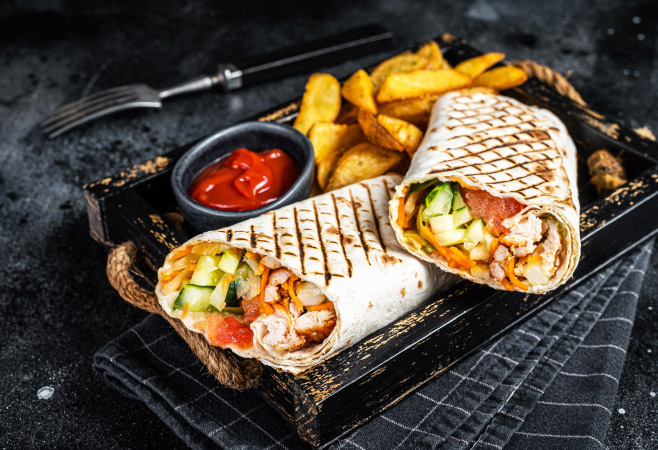 Shawarma with meat, vegetable salad and french fries
Shawarma with meat, vegetable salad and french fries
Samosas – A South Asian favorite that has become a beloved snack in Kuwait, often enjoyed during Ramadan or as a quick bite.
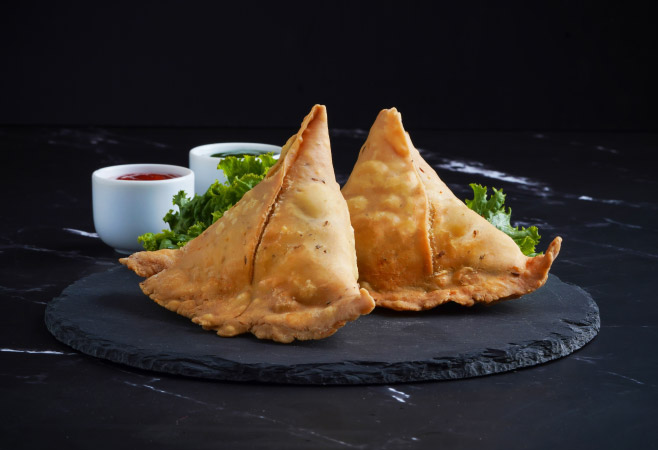 Samosas in kuwait
Samosas in kuwait
Falafel – Deep-fried balls made from chickpeas, herbs, and spices, falafel is a favorite among both locals and visitors, often served with tahini and salad.
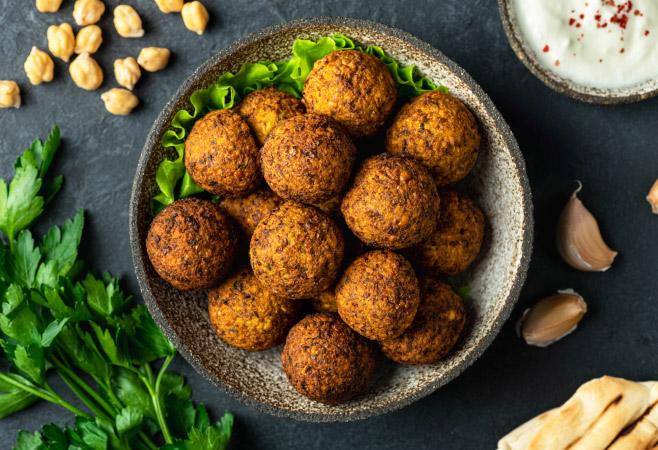 Falafel in kuwait
Falafel in kuwait
Kuwait's Rich Seafood Tradition
Given its location on the Persian Gulf, seafood in Kuwait is a staple in the national diet. And fresh fish and shellfish are consumed in all forms, grilled, stewed, or fried.
- Machboos with Fish – It is a standard recipe of cooked rice flavored with saffron and accompanied by fish, either grilled or fried. It is a tasting dish, which is heart-warming and reveals the flavor of the Kuwaiti culture of food.
- Samboosa with Shrimp – Shrimp samboosa is a delicious twist on the traditional snack, perfect for a light and crispy appetizer.
- Fried Hammour – A popular fish, often served whole, fried to perfection with a tangy sauce.
The fact that seafood is plentiful makes it an unmissable element of Kuwaiti cuisine, whether it is in a fancy restaurant or a small shack by the beach.
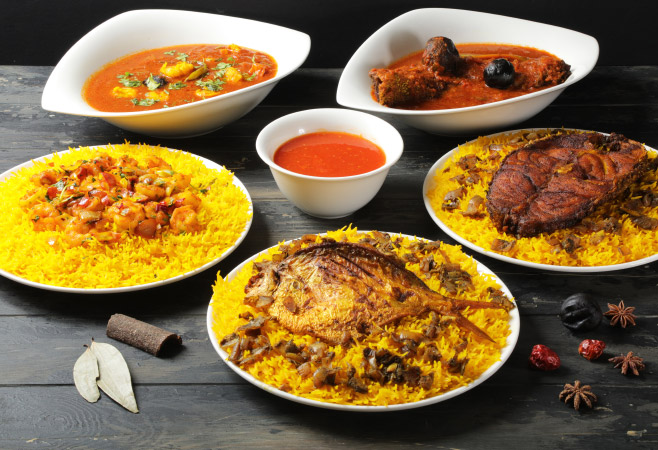 Majboos samak fish, majboos robian shrimp, marak hamoure, dakous
Majboos samak fish, majboos robian shrimp, marak hamoure, dakous
Kuwaiti Breakfast Options: A Hearty Start to Your Day
Regarding the Kuwaiti breakfast choices, the residents have a mixed menu between the salty and sweet tastes and tinges, which make breakfast a wealthy as well as a complete dish of the day.
- Balaleet – A beloved Kuwaiti dish made from sweetened vermicelli noodles and eggs, often served during festive occasions like Eid or as a special breakfast treat.
- Harees – The dish is made out of crushed wheat that is cooked together with meat, typically chicken or lamb, to result in porridge. It is also a satisfying and delicious breakfast, which has been a Kuwaiti staple food for centuries.
- Khubz and Labneh – A common Middle Eastern breakfast also enjoyed in Kuwait, featuring freshly baked flatbread served with strained yogurt, olive oil, and herbs
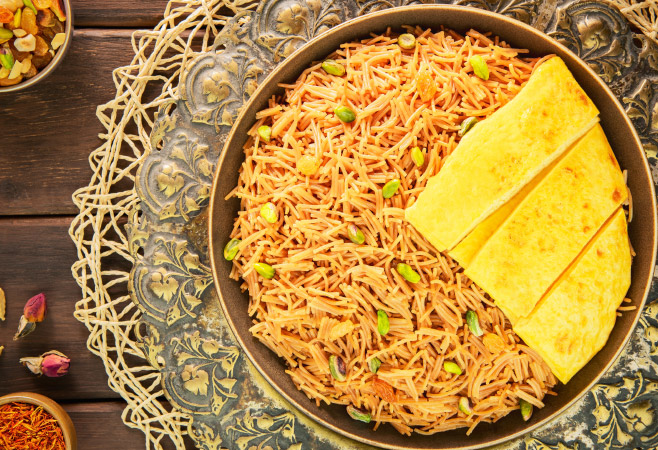 Balaleet kuwait
Balaleet kuwait
Kuwaiti Desserts: A Sweet Conclusion to Any Meal
The Kuwaiti menu has as many variants of desserts as the country does. The focus on nuts, honey, and light, delicate tastes keeps the food sweet at the end of all meals.
- Kunafa – A yummy dessert made out of wicked phyllo dough, shredded and put into sweet cheese or semolina pockets, soaked in syrup, and served with pistachio garnish.
- Basbousa – Otherwise called Hareeseh in other parts of the country, this is a semolina cake scented with coconut and steeped in a syrup made of water and sugar. It is usually consumed during celebrations.
- Qatayef – The stuffed pastry that has usually been consumed during the period of Ramadan is stuffed with cream or even nuts and is then prepared by deep-frying and immersing it in the syrup.
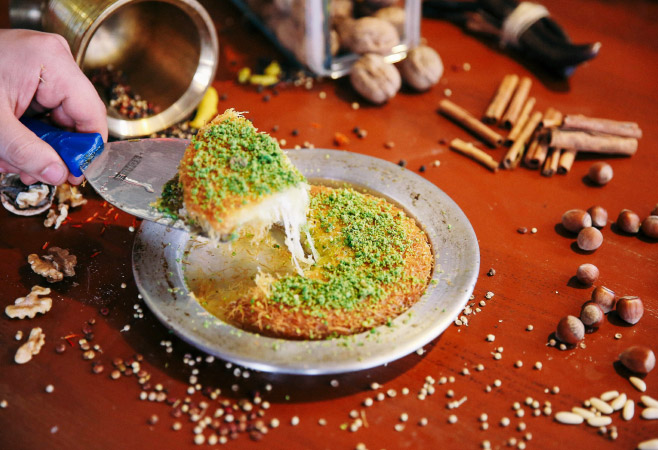 Kunafa kuwait
Kunafa kuwait
Kuwait Coffee Culture: A Tradition of Warm Hospitality
Coffee in Kuwait is not only a drink but also a sign of hospitality and respect. Kuwaiti coffee culture centers on how the Arabic coffee, or the Gahwah, is prepared and shared among the people as a sign of hospitality.
It is also prepared by brewing coffee with cardamom or even saffron and served in small cups. Arabic coffee,
Kuwaiti-style, is a traditional art that has been practiced over the years since it involves a custom of serving visitors at the residence and during meetings. The conventional way of percolating and drinking coffee in a shared fashion brings to the fore the significance of the Kuwaiti food culture as a means of socializing or networking in the country.
 Traditional coffee in mosque
Traditional coffee in mosque
Kuwaiti Tea Traditions: A Moment to Unwind
The Kuwaiti tea customs, just like coffee, are an imperative aspect of societal life. After the meals or during social visits, the tea is served strong, and most of the time it may contain cardamom or other spices. It is not strange to use small cups where it is possible to have several rounds in the course of a visit.
- Chai Karak – A popular tea made with strong brewed tea leaves, condensed milk, and spices. It’s a sweet, aromatic tea that can be found in most cafes throughout Kuwait.
- Mint Tea – Often served with fresh mint leaves, this refreshing drink is a favorite in the warmer months.
 Men at the benches with the tea and talking
Men at the benches with the tea and talking
Vegan Food in Kuwait: Plant-Based Delights
Although traditional Kuwaiti cuisine is meat-based, plant-based options are becoming increasingly popular, especially among younger generations and health-conscious diners. Kuwait has a number of plant-based foods with an emphasis on fresh vegetables, legumes, and grains.
- Falafel – Naturally vegan, falafel is made from chickpeas, herbs, and spices.
- Mujaddara – A flavorful dish made from rice, lentils, and caramelized onions.
- Tabbouleh – A refreshing salad made with parsley, mint, tomatoes, and bulgur, perfect for a light and healthy meal.
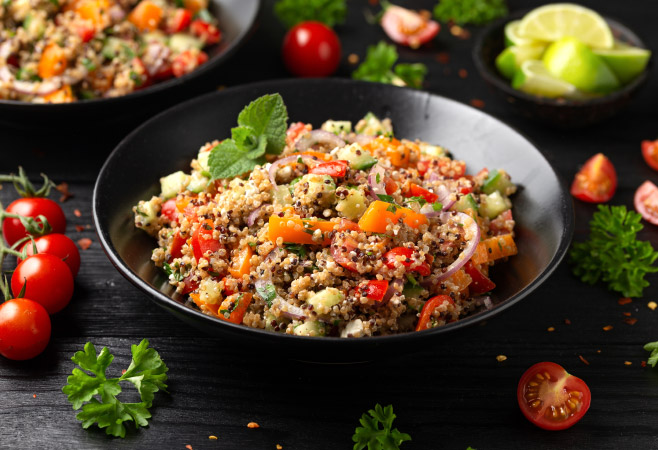 Tabbouleh Kuwait
Tabbouleh Kuwait
Conclusion
Kuwait's food culture is a cuisine that any fan of food needs to experience due to its variety and deliciousness. Kuwait has a rich taste of dishes, including savory and sweet dishes such as machboos and shawarma, or kunafa and basbousa, that demonstrate a perfect combination of traditional and modern aspects of a food dish. Whether you are satisfying your sweet tooth on the best Kuwaiti desserts or resolving to drink Kuwaiti tea, every meal is a narration of the rich Kuwaiti history and culture, together with its culture of hospitality.
As you start your food expedition, do not forget to apply for your Kuwait visa via Kuwait Immigration Services to process and have a hassle-free entry to this food-oriented, rich country. All you will need is a short time to enjoy the Kuwait food culture since their simple online procedure and expediting time are quite fast.
Related Articles
- Weekend in Kuwait: How to Spend 2 Perfect Days in the Country
- Kuwait eVisa vs Embassy Visa: Which Option Is Better for Travelers?
- Ashura in Kuwait: Meaning, Observance, and Travel Considerations
- Eid al-Adha in Kuwait: Traditions, Public Holidays, and Travel Tips
- Eid al-Fitr in Kuwait: Traditions, Celebrations, and Travel Tips
- Ramadan in Kuwait: What Tourists and Expats Need to Know
- Kuwait Cultural Taboos – What Every Visitor Should Know Before Traveling
- Kuwait Beach Resorts – Discover Luxury and Serenity by the Arabian Gulf
- Kuwait Food Tour – A Culinary Journey Through the Heart of Arabia
- Wildlife in Kuwait – Discovering Nature in the Heart of the Desert
HOW CAN WE HELP?
APPLY WITH CONFIDENCE
|










